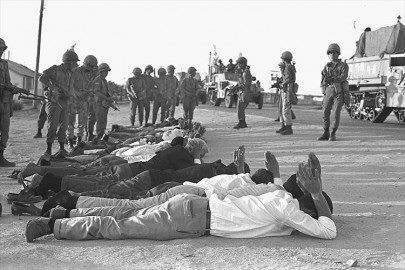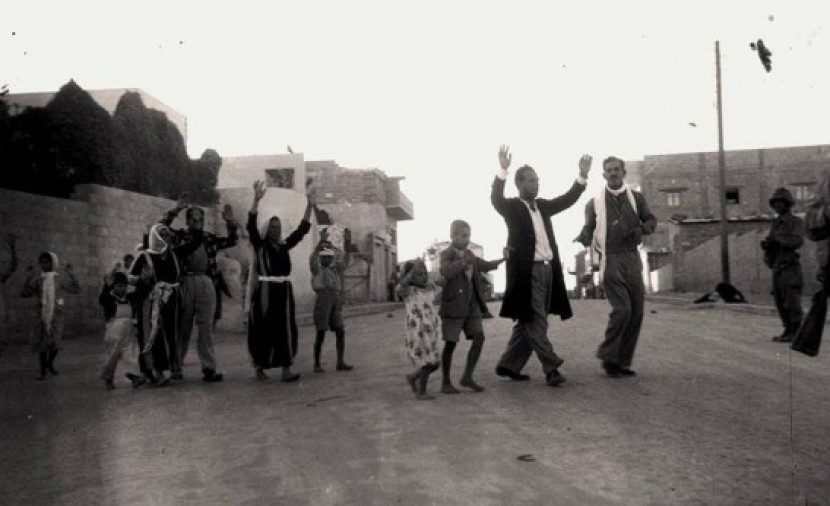For the last seven decades, Palestinians have been witnessing their own ethnic with Israel continuing to make way for Jewish settlers from abroad.
It was way before 15 May 1948 when Palestinians first started seeing Jewish settlers ransack their homes, in a controversial and devastating move that sparked the start of the Nakba.
Between 1947 until 1949, at least 750,000 Palestinian from a 1.9 million-strong native population were forced into becoming refugees – and while this may seem like a lifetime ago, the memories are still fresh in the minds of those who were stripped of their rights.
Among the hundreds of thousands of Palestinians forcibly removed out of their own homes and land was Ibrahim Abu Al Foul, whose early memories are solely associated with first-hand violence he witnessed by the apartheid state.
Born in Yibna, a Palestinian village captured by Israel two years before the establishment of the illegal state, Abu Al Foul is able to recount his childhood experience and the moment in which he went from waking up under a safe ceiling to the roof of a UNRWA tent.
“There’s an incident that my uncle would always remind me of..,” he told Doha News, before drifting off into his story.
“We were kids playing near sand dunes and people started running away because Israeli Jews started making their way to the families’ neighbourhoods. Everyone ran away but I stayed, because I could not comprehend what was happening,” he explained.
Within minutes, the oblivious young boy found himself between the hands of two men who claimed to be Egyptian soldiers. Seeing what was unravelling, his uncle quickly pounced to his rescue.
“My uncle asked them why they took me, so one of them responded by saying ‘we did not take him, you left him here’. They refused to let me go until my family asked for their identification,” he said, noting it was unusual for Egyptian troops at the time to be on horseback.
As their home and land slipped away, the family were given no other option but to walk around 80km through the Gaza Strip and onto Rafah, where some 41,000 Palestinians sought refuge as Israel continued to pillage Palestine.
Some were left to struggle in tens, others were able to build homes and a few others were moved on to a nearby housing project at Tel El-Sultan.
For Abu Al Foul and his family, their new life began in a tent at a camp that regularly saw heavy snowfall as seasons came and went.
How this Palestinian businessman in Qatar helps farmers under Israeli occupation
Among the most unforgettable days for Abu Al Foul was 12 November 1956 – the day of the Rafah massacre.
That morning, he woke up to calls from occupation forces demanding all men aged 15 to 45 to go to the Amiri school or else face punishment.
“People woke up early in the morning and walked out of their houses to the school with their arms raised. I even remember the women from my family gathering in one home and the children, us, staying with them. The soldiers were stationed on both sides of the roads, all of them were armed.”
The people who heard the calls left their houses, not knowing whether they would step back into them again alive or not. Those who did not hear the calls were attacked by occupation forces after Israeli settlers stormed their homes.
“They randomly shot young men who were walking. The bodies [of people killed] kept piling up on the way to the school. They dug up a trench on the school’s entrance where an Israeli soldier stood and hit those [Palestinians] inside with tree branches. Whoever took a hit in their head obviously died,” said Abu Al Foul.
His own father spent an entire year suffering from neck pain due to the beating.
The men that did not end up in the pit would be taken inside the school to be physically humiliated and brutally beaten up.
“When they entered the school, they made everyone lie down on the floor and were not allowed to raise their heads. Even those who wanted to urinate were left with no choice but to wet their pants. The Israelis soldiers kept firing bullets in the air [as Palestinians lay on the ground],” said Abu Al Foul.
The beating continued until four in the afternoon, when an English soldier arrived at the scene and saw the Palestinians lying on the ground. Some soldiers argued among themselves until those on the ground were finally allowed to lift their heads.
Abu Al Foul said his teacher was late to school on the morning of the massacre and had to head back home to get his ID, only for him to be shot by Israeli soldiers. Blood splattered all over the walls of his home, he remembered.
“His own wife refused to clean up the blood after they buried him,” said Abu Al Foul, adding that some young men were shot in front of their own mothers despite begging and pleading.
Hundreds of Palestinians were murdered that day and Abu Al Foul says Israeli troops forced Palestinians to gather the corpses for burial in a mass grave.
“They then shot the 30 men and threw them in the same grave.”
Abu Al Foul also witnessed the six-day Arab war in 1967, also known as “Al Naksa” [the Setback] shortly before leaving for Qatar where his father worked as a farmer at the time.
Al Naksa began when Israel waged a deadly war against three Arab countries – Jordan, Syria and Egypt – and declared victory after just six days.
The war marked the beginning of the occupation of Jerusalem, the West Bank, Gaza and the Golan Heights, paving the way for Israel to expand its presence in Palestine.
“It was a great loss for Arabs,” said Abu Al Foul.
With no home to return to, his father later moved the family to Qatar thanks to free flight tickets from the Arab League.
“They [Qataris] welcomed us and we were easily given residence permits,” he said.
Read also: ‘The apartheid remains’: Palestinian filmmaker urges action from global arts industry
Soon after settling in, Abu Al Foul landed a job in Doha at an agricultural company where his salary at the time was QAR 400, at the time a generous amount that allowed him to food on the table.
For those like Abu Al Foul who come from villages with rich and generous soils in Palestine, farming is an integral part of their identity.
After working as a teacher at several schools in Qatar, he managed to return to his true passion for farming by opening a plant nursery named “Zahrat Al Madaen” [the flower of all cities], named after a song by prominent Lebanese singer Fairuz.
“I wanted a name associated with Al Quds, until a friend said ‘don’t you listen to Fairuz?’”
Seven decades on, Abu Al Foul sits in the oil rich Gulf state where he has built a life for himself and formed a large family. Despite the ample time that has passed, his past memories of Palestine remain unchanged – Israel still occupies his country under inhumane conditions.
Commenting on May’s deadly offensive and comparing the international response to those of the past, Abu Al Foul sees hope.
“The latest offensive [on Gaza] proved Israel’s weakness…Al Jazeera had a huge influence on the world through its coverage of the war, May God reward them,” he said, noting more people around the world are now siding with Palestinians after becoming aware of Israeli crimes.
“Palestinians understand the occupation. People thought the old generation will forget and [the history will be forgotten], but on the contrary the current generation fighting them [the occupation].”
Since leaving his home, Abu Al Foul has only returned once in 1984 but has been unable to set foot in his own country since.
His seven children, all all of Palestinian heritage, only know of their homeland from stories shared by their father.
“Israel hasn’t even left the space for a two-state solution, may it [the apartheid state] collapse on their heads…hopefully the next war is going to be the war of liberation,” he hoped.
Follow Doha News on Twitter, Instagram, Facebook and Youtube









